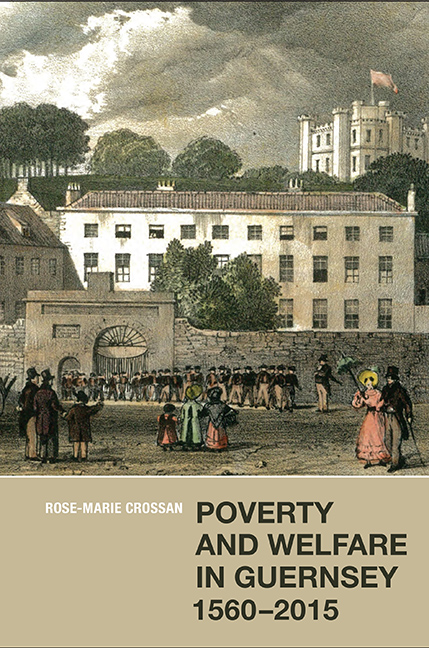Book contents
- Frontmatter
- Dedication
- Contents
- List of Illustrations
- Acknowledgements
- Abbreviations
- Conventions, Note on curren
- Maps
- Introduction
- I Context
- II Welfare
- III Town Hospital
- IV Twentieth Century and Beyond
- Conclusion
- Appendix 1 Writings on Peasant Proprietorship in Guernsey
- Appendix 2 Poor Rates, Indoor and Outdoor Relief Spending, St Peter Port, 1724–1924
- Appendix 3 Parochial Poor Relief in Other Channel Islands
- Appendix 4 Average Year-end Head-counts and Average Annual Admissions and Discharges, Town Hospital, 1700s–1900s
- Appendix 5 Adult Admissions Ascribed to Illness and Accidents, Town Hospital, 1852–1919
- Appendix 6 Relative Proportions of Men and Women in Year-end Head-counts and Annual Admissions, Town Hospital, 1750–1919
- Appendix 7 Annual Averages of Child Admissions and Year-end Numbers, Town Hospital, 1756–1919
- Appendix 8 Over-60s as a Proportion of all Inmates, and Composition by Sex of Over-60s Cohort, Town Hospital, 1756–1911
- Appendix 9 Average Weekly Amounts Purchased per Head, Town Hospital, 1760–1917
- Appendix 10 Timeline: Developments in Poor Relief and Social Security, 1700–2010
- Bibliography
- Index
- Frontmatter
- Dedication
- Contents
- List of Illustrations
- Acknowledgements
- Abbreviations
- Conventions, Note on curren
- Maps
- Introduction
- I Context
- II Welfare
- III Town Hospital
- IV Twentieth Century and Beyond
- Conclusion
- Appendix 1 Writings on Peasant Proprietorship in Guernsey
- Appendix 2 Poor Rates, Indoor and Outdoor Relief Spending, St Peter Port, 1724–1924
- Appendix 3 Parochial Poor Relief in Other Channel Islands
- Appendix 4 Average Year-end Head-counts and Average Annual Admissions and Discharges, Town Hospital, 1700s–1900s
- Appendix 5 Adult Admissions Ascribed to Illness and Accidents, Town Hospital, 1852–1919
- Appendix 6 Relative Proportions of Men and Women in Year-end Head-counts and Annual Admissions, Town Hospital, 1750–1919
- Appendix 7 Annual Averages of Child Admissions and Year-end Numbers, Town Hospital, 1756–1919
- Appendix 8 Over-60s as a Proportion of all Inmates, and Composition by Sex of Over-60s Cohort, Town Hospital, 1756–1911
- Appendix 9 Average Weekly Amounts Purchased per Head, Town Hospital, 1760–1917
- Appendix 10 Timeline: Developments in Poor Relief and Social Security, 1700–2010
- Bibliography
- Index
Summary
Town Hospital registers are rich in the sort of domestic detail not often found in historical documents. Copious evidence is preserved on the minutiae of everyday life, from the beds inmates slept in and the clothing they wore to the food they ate and the punishments they suffered. This chapter will examine such minutiae in depth. The intention is a dual one: to recover something of the lived experience of past human beings, and to illuminate the norms of the society to which they belonged.
Routines and rhythms
From the outset, regimentation was key to Hospital life. The passage of the day was marked by the ringing of a bell. It rang out the hours of rising and retiring, of beginning and ending work and of the three daily meals. Under the rules of 1743, the summer timetable was as follows:
6.00 a.m. – rise
6.30 a.m. – breakfast
7.00 a.m. – begin work
1.00 p.m. – break for dinner
7.00 p.m. – finish work/assemble for supper
9.00 p.m. – retire.
Subsequent rules introduced minor variations, but a imilar timetable obtained as late as World War I. Prayers preceded breakfast and followed supper every day. From 1743 until the end of the nineteenth century, inmates were locked into their dormitories at night.
For most of their waking hours, inmates were bound by Hospital rules to do any work deemed suitable to their age, sex and physical condition. In the 1700s and early 1800s, inmates of both sexes and all ages worked in the Hospital's manufacturing enterprises as well as performing all the chores of the house. By the mid-1800s, most formal manufacturing had been discontinued, but a census of inmates dating from August 1870 shows that more than two-thirds of the Hospital's inmates still had a regular domestic occupation: as cooks, laundresses, nurses, store-keepers, porters, messengers and much else.
Aside from their work indoors, inmates were also used to perform ad hoc tasks around the parish. For a few years the Hospital supplied St Peter Port with its town crier. Gangs of Hospital men and boys were regularly sent out to clean St Peter Port's streets, cemeteries and parks, sometimes in a distinctive ‘striped frock’. Inmates staffed the public soup kitchen, occasionally helped the fire brigade and even distributed Billets d’Etat in advance of States meetings.
- Type
- Chapter
- Information
- Poverty and Welfare in Guernsey, 1560-2015 , pp. 211 - 238Publisher: Boydell & BrewerPrint publication year: 2015



